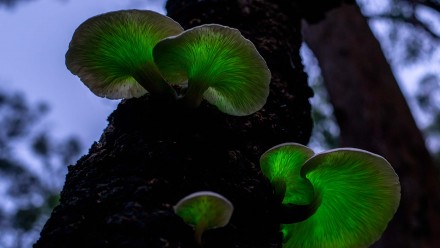News & events
Nature’s nightlight: the glowing mushrooms found in Australian forests
What’s the science behind these ghosts?Scientists show how we can anticipate rather than react to extinction in mammals
A new study shows that we can use existing conservation data to predict which currently unthreatened species could become threatened and take proactive action to prevent their decline before it is too late.Superb fairy-wrens picky when helping others in distress
Superb fairy-wrens are more likely to take risks to help members of their close social circle, according to a new study.Pages
E&E PhD Exit Seminar: Genomic epidemiology of oat crown rust disease in Australia and abroad uncovers diverse mechanisms to generate diversity
Event recordings
11 February 2022
Veronica Alozie-Chidi, Gordon Group, E&E, RSB
The extra-intestinal pathogenic E. coli lineages STs 131, 73 and 95, of the phylogroup B2 are equally likely to be responsible for hospital- and community-acquired human extra-...
17 December 2021
Suha Naser, Lanfear Group, E&E, RSB
Phylogenetic inference is the process of reconstructing relationships between species from genomic sequence data. The reliability of phylogenetic analysis relies on the quality of...
12 November 2021
Judith Bourne, Gordon Group, E&E, RSB
Escherichia coli extraintestinal infections (ExPEC) cause significant disease in humans and companion animals (cats and dogs).
29 October 2021
Upama Aich, Jennions Group, E&E, RSB
What is the effect of male age under sexual selection? Studies testing for age effects on reproduction have largely focused on female ageing and maternal effects, and the...
21 October 2021
Emily DuVal, Florida State University
Social behaviors are essential to the lives of many animals. “Complex” social behaviors are interactions among conspecifics take many forms, including repeated associations with...
8 October 2021
Yi-Yang (Alex) Chen, Jennions Group, E&E, RSB
Canopy-forming seaweeds, generally brown macroalgae, are worldwide dominant primary producers and habitat constructors in our marine environments.
23 September 2021
Jun Otsuka (Kyoto University), Tobias Uller (Lund University)
Invited Panel: Simone Blomberg and Shinichi Nakagawa
2 September 2021
Prof Rebecca Kilner, Cambridge University, UK
For more than 50 years, the scientific study of animal behaviour has been defined by Tinbergen’s Four Questions. Two of his questions consider the connection between evolution and...
12 August 2021
A/Prof Patrick Savage, Keio University, Dr Xia Hua, Australian National University
Invited Panel: Michael Kasumovic & Dominique Potvin
5 August 2021
Rob Brooks, University of New South Wales
New developments in robotics, virtual reality, and especially artificial intelligence (AI) are giving rise to a new type of technologies: the ‘artificial intimacies’.
- ‹ previous
- 5 of 10
- next ›








